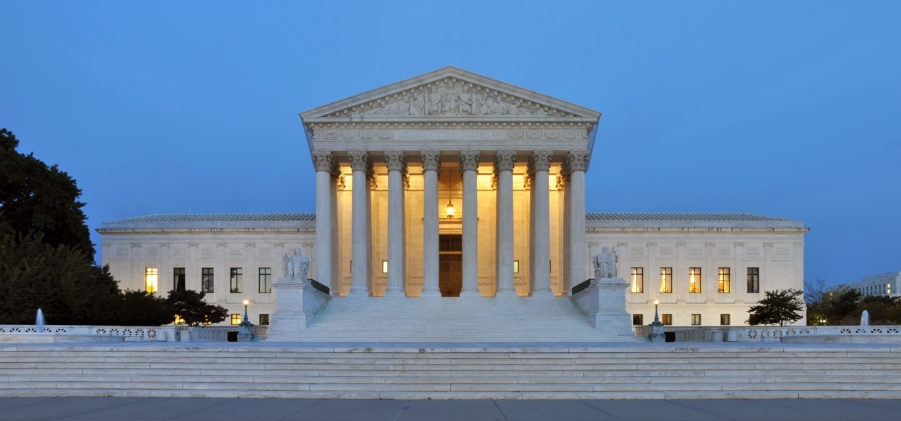The Trump administration is asking the Supreme Court to throw out a landmark 2016 ruling of the D.C. Circuit that upheld the authority of the Federal Communications Commission to compel net neutrality.
In U.S. Telecom Association v. FCC, the D.C. Circuit sided with the Obama-era FCC in a lawsuit brought by the broadband industry challenging the agency’s sweeping net neutrality regulations. Industry groups then petitioned for Supreme Court review, and those petitions have been sitting on the Supreme Court’s docket for nearly a year.
While they’ve been sitting there, the FCC, having shifted to Republican control, repealed the net neutrality rules. That repeal took effect in June. And on Thursday (Aug. 2), the Trump administration finally weighed in on how it believes the Supreme Court should handle the still-pending cert petitions. Those petitions, the solicitor general said in a brief, have become moot as a result of the repeal, and rather than let the D.C. Circuit’s pivotal 114-page ruling in U.S. Telecom stand, the Supreme Court should simply wipe it off the books.
The administration almost certainly is thinking ahead to the future of net neutrality litigation. If the Supreme Court were to take the administration’s suggestion, it would erase the U.S. Telecom ruling as precedent in the D.C. Circuit. That would be a welcome development for the administration as the FCC prepares to defend itself in a new lawsuit brought by supporters of net neutrality challenging the agency’s change in position and recent repeal. After all, U.S. Telecom found the Obama-era rules to be legal, but the FCC’s current position is that the repeal was necessary because the Obama-era rules were illegal from the start. The agency’s position will be tested in Mozilla v. FCC, which is in its early stages in the D.C. Circuit.
In its brief to the Supreme Court last week, the government cited the new litigation as a reason for its unusual request. Throwing out the 2016 U.S. Telecom ruling, the government said, would be “particularly appropriate here, where many of the same parties are already litigating related legal questions” in the new Mozilla lawsuit and consolidated cases.
Putting aside its effect on that litigation, vacating U.S. Telecom would wipe away a monumental opinion, co-written by Judges Tatel and Srinivasan, that aggressively expanded the scope of the FCC’s authority to regulate the internet. Tatel and Srinivasan held that the FCC acted lawfully when it made a controversial choice to reclassify broadband providers as “common carriers” and to prohibit them from blocking or slowing down internet content based on its source.
The government’s request to vacate the ruling comes under an arcane legal practice known as the Munsingwear doctrine. That doctrine arises when a lower court issues a ruling and then, before the Supreme Court can review the merits of that ruling, the prevailing party takes some action to eliminate the live dispute between the parties—a circumstance lawyers refer to as “mootness.” Here, the FCC arguably made the broadband industry’s challenges to the Obama-era net neutrality rules moot by changing policies and repealing those rules.
In such circumstances, the Supreme Court will sometimes vacate the lower court’s ruling on the theory that the Supreme Court never had a chance to review its merits and it therefore should not be allowed to stand. In fact, earlier this year, the Supreme Court invoked the Munsingwear doctrine in another controversial case out of the D.C. Circuit involving the Trump administration. The Supreme Court used the doctrine to vacate the D.C. Circuit’s ruling in Azar v. Garza (formerly known as Garza v. Hargan), which allowed an undocumented teenager being held in government custody to get an abortion. The case had become moot by time it reached the justices because the teenager received the abortion the day after the D.C. Circuit’s ruling.
But back to net neutrality. In the pending petitions at the Supreme Court (which have been consolidated under Berninger v. FCC), supporters of net neutrality are expected to file briefs arguing that the D.C. Circuit’s U.S. Telecom ruling should not be vacated under the Munsingwear doctrine. It’s likely to take months before the justices announce how they wish to proceed.
For an in-depth look at the D.C. Circuit’s decade-long role in the net neutrality debate, see Circuit Breaker’s previous coverage here.
Here is the full brief filed in the Supreme Court by the Trump administration on Thursday:

